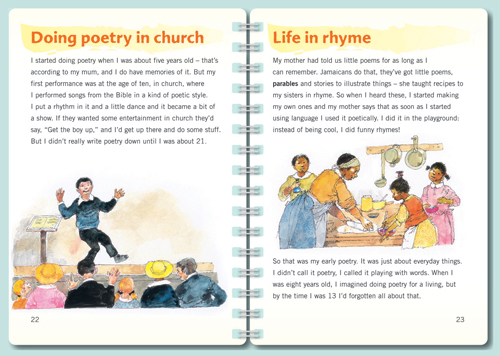Professor Benjamin Zephaniah considers why he struggled with reading at school, and what more might have been done to engage him...
I’m a writer. Honest. If you don’t believe me go to the internet and do that Google thing. Or ask my mum, she knows. Most of my life is now spent writing, and reading, which is strange when you think that at school I hated reading and writing. I don’t remember being taught to read things, just being told to read things, and then when I read them badly I remember being told off.
Sometimes when I tell my friends about my experiences in school they automatically blame the teachers. I don’t. Teachers (and everyone else) didn’t understand what dyslexia was, textbooks were outdated and racist, and teachers were taught to ‘teach’, in the strictest sense of the word, and not engage. But for a moment imagine that they did engaged with me, imagine they really spoke to me. I would have told them that my mother was a story teller, and my grand mother was a story teller. I would have told them that I come from a long line of griots and I loved stories, I loved poetry, I even loved learning, but I had problems engaging.
 How can pupils like me reach their full potential? I’m not qualified to lecture teachers on how to teach, and I don’t understand what the rules are now. I do spend a lot of time going into schools, but it seems that every Author’s view few months teachers are given new guidelines (or targets) from the powers that be, and I just can’t keep up with them. But how I wished that a teacher teaching me would have asked simple questions like, ‘So what would you like to read about?’, or ‘What do you want to tell the world?, or even ‘How are you really feeling?’. I would have opened up. I had a lot to say, but instead I was silent, naughty, and bitter.
How can pupils like me reach their full potential? I’m not qualified to lecture teachers on how to teach, and I don’t understand what the rules are now. I do spend a lot of time going into schools, but it seems that every Author’s view few months teachers are given new guidelines (or targets) from the powers that be, and I just can’t keep up with them. But how I wished that a teacher teaching me would have asked simple questions like, ‘So what would you like to read about?’, or ‘What do you want to tell the world?, or even ‘How are you really feeling?’. I would have opened up. I had a lot to say, but instead I was silent, naughty, and bitter.
I do know this. Many of the people that write to me about their love of literature, and nearly all the people that come to my readings will tell me that I turned them on to poetry, or they were turned on by a teacher who really loved poetry. A teacher that is full of passion can spread that passion. When a teacher gives a pupil something to read and says ‘this is for you,’ it can make a great difference.
Knowing just how much of a reluctant reader I was, I ask one big question every time I sit down to write a novel. ‘What would I have liked to have read when I was young?’ I am my research. When I think of all the pressures young people are under from their peers, the media, and the adults around them, I want them to know that I’m on their side, I want them to know that I too found this world difficult to understand, and that by reading this you will understand more. But it gets better. I want them to know that when you understand more, and you begin to get big ideas of your own, you can write a book too. Like me. I’m a writer. I didn’t have a great start in life, I didn’t have a great education, and I didn’t even like school that much, but now look at me. I have ambition. When I grow up I want to be a teacher.
Benjamin Zephaniah is an author for Collins Big Cat. A new range of books designed for KS2 children reading at a KS1 level - Collins Big Cat Progress - has just been added to the reading programme. It provides age-appropriate texts to build confidence and foster positive attitudes towards reading. To find out how Progress could help struggling readers in your class, visit collinsbigcat.com for more details.

8 Ways To Get Your Class Drawing
Ace-Art-And-Design
Make every lesson an experiment
Cross Curricular
5 friendship and emotions intervention ideas
Ace-Classroom-Support
